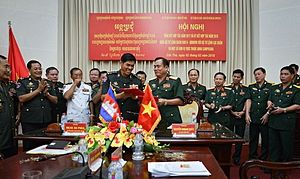Last week, units from the Vietnamese and Cambodian militaries inked a pact on the future direction of their cooperation for the year. The signing represented just the latest move undertaken by both sides to chart out their defense cooperation which has been expanding over the past few years.
As I have noted before, though Vietnam and Cambodia are neighboring Southeast Asian states with a contemporary diplomatic relationship that dates back over half a century, the real moment that continues to be rhetorically emphasized officially by the two countries is Hanoi’s role in overthrowing the Khmer Rouge in 1979 which paved the way for the current regime led by Prime Minister Hun Sen in 1979.
On the defense side, Vietnam provides the Royal Cambodian Armed Forces (RCAF) with military equipment, infrastructure, and training, while both countries have also looked to manage more sensitive areas of the relationship such as outstanding issues over their shared 700-mile long border and managing illegal fishing in surrounding waters. Last year, which marked the 50th anniversary of the establishment of diplomatic ties, saw some advances in the defense relationship as well, with a defense policy dialogue taking place in December.
That cooperation has continued on into 2018, which is a significant year for the ruling Cambodian People’s Party (CPP) with elections coming up in May. In terms of ongoing developments, in January, we have witnessed these go on as planned, whether it be the 50th iteration of their joint naval patrols or the unveiling of a new Vietnamese-funded headquarters for the High Command of the Royal Cambodian Army that occurred during its 19th anniversary.
But both sides have also continued to review their defense cooperation and chart out a clearer direction for this aspect of relations for the rest of the year, even though some of the groundwork had admittedly already been completed months prior including with the defense policy dialogue held last December.
For instance, in mid-January, Cambodian Defense Minister Tea Banh and Vietnam Defense Minister Ngo Xuan Lich met and reviewed their defense ties, with the cooperation plan inked for the two defense ministries for the year addressed issues such as training and border cooperation. In addition, last week, units of the two armies inked a memorandum of understanding on cooperation for the year, which the Vietnamese military said covered various areas including information exchange and the search and collection of remains of Vietnamese soldiers during the wartime period.
Though such events may be routine, they offer at least some parameters of what to expect from the bilateral defense relationship for the remainder of 2018.































